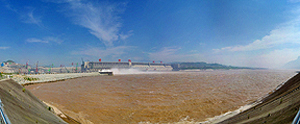Giant dam not responsible for large earthquake
Giant dam not responsible for large earthquake
Submitted by Ned Rozell
Phone: 907-474-7468
06/10/08

About nine years ago, I wrote in this column how the National Aeronautics and Space Administration funded two University of Alaska Fairbanks scientists to examine whether the pooling of water behind the massive Three Gorges Dam in China might cause earthquakes.
After the magnitude 7.9 earthquake in northern China on May 12, 2008, journalists from China and London, and an observant reader, e-mailed the UAF Geophysical Institute to see if the creation of the dam, which is nearing completion and holding back ever-increasing amounts of water, might have caused the earthquake.
First, a little background that was in the 1999 article www.gi.alaska.edu/ScienceForum/ASF14/1465.html the Three Gorges Dam spans the middle portion of the third-longest river in the world, the Yangtze, which is more than twice the length of the Yukon. The concrete of the dam makes a wall 600 feet high and one mile long. The water behind the wall is more than 445 feet deep, with a maximum depth of 575 feet, expected when engineers complete the filling of the dam in 2009. The lake behind the dam (made possible by the abandonment of more than 1,400 rural towns) is longer than Lake Superior. When the dam is at its peak, it will provide the electricity of 18 nuclear power plants. Engineers expect the dam to also help control floods that have killed hundreds of thousands of people along the Yangtze.
However, scientists were wary of putting that much load on the crust of the earth in an area with weak spots known as faults. Local faults can slip and cause earthquakes when dammed water presses on the earth. Some scientists believe that’s what happened when a large earthquake followed the construction of a dam in Konya, Turkey that killed 200 people in 1967. Seismologists with the U.S. Geological Survey think the same thing may have happened at California’s Oroville Dam in the 1970s when seismometers rang with small earthquakes after engineers raised the water level behind the dam. Along with the pressure all that water exerts on the earth’s crust, the impounding of water can also change pore pressure within soils near dams, which can trigger nearby earthquakes.
Jeff Freymueller and Shusun Li are the scientists at the Geophysical Institute who have monitored the stresses on seismic faults in the Three Gorges region, using precise GPS receivers and satellite data. Li, who grew up in Shanghai, China, downriver from the dam, said he believes the giantdam was not involved in the recent earthquake. Freymueller agrees.
"Because of the large distance (400 miles) between the dam and the earthquake, it is unlikely that the dam and reservoir had a significant impact," Freymueller wrote in an e-mail to a television news producer in London. "The main cause (probably the only cause) of the earthquake is the eastward motion of the eastern Tibetan plateau relative to south China. This is ultimately driven by the collision of India with Eurasia."
Another note on the recent earthquake in eastern Sichuan, China: it was a magnitude 7.9, the same as the Denali Fault earthquake in November 2002. No one died in the Alaska earthquake, due to the fact that it tore through mountains where few people live, while the China earthquake killed at least 68,800 people. During that earthquake, "the ground suddenly jumped, shifted, or sank by at least one-and-a-half meters (5 feet) in a matter of seconds," according to Mario Chavez at the National Autonomous University of Mexico, as reported by the American Geophysical Union.
This column is provided as a public service by the Geophysical Institute, University of Alaska Fairbanks, in cooperation with the UAF research community. Ned Rozell is a science writer at the institute. This column was first printed in 1999. Rozell is currently out of state.


